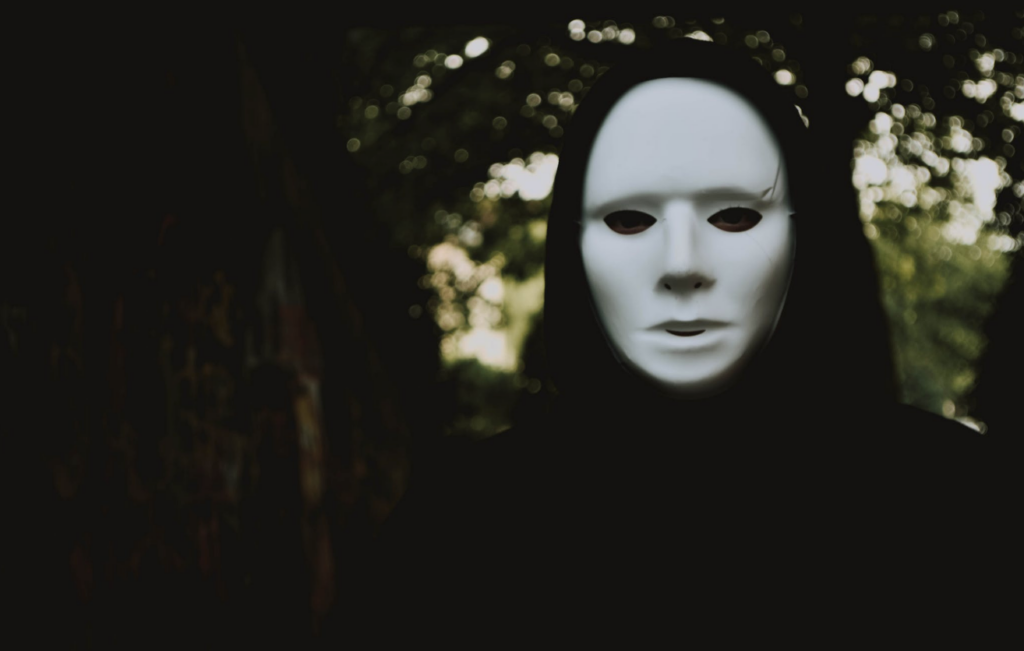
Evil has been one of the most fascinating topics among humans since we created the ability to have heated conversations. Humans would gather to argue over roasted mammoth after the hunt was over.
Was Urg’s son, Perry, simply hard to handle or evil? If he was evil, then why? Had the gods cursed him somehow? Too many blows to the head?
Maybe the parents were to blame.
Granted, Perry’s mother, Yell, was better with a battle club than her husband. Urg preferred chewing mammoth skins and decorating hides.
Yell was awesome at killing stuff and the whole tribe was on a list for Urg to renovate their caves, but all this aside?
Young Perry was simply terrifying.
To be fair, Perry’s insatiable urge to kill small animals kept them all with plenty of snacks. He also loved to set these things called ‘fires’ and those had seriously come in handy, but still.
No one trusted him near the small children and babies, mostly because they tended to go missing.
So the tribe discussed this new idea of ‘evil’ over one of Perry’s disconcertingly convenient fires.
And they probably had trolls back then, too. Just argued to argue. Like the giant turtle in the sky was really a rock. But humans pretty much all carried big sticks so likely campfire trolls behaved better.
At least they did in my head.
For those humans too lazy to carry a big stick (or who forgot to bring one–‘my ancestors’) they just drew cave paintings telling the story of Og the Campfire Troll’s tiny man parts.
They spun a yarn in colorful pictograms about how Og the Campfire Troll really didn’t kill that saber-toothed tiger. The poor beast fell over when it saw Og’s tiny man part then died of embarrassment.
And the satirist was born! Proving the sharpened stick dipped in colorful mud was mightier than the club.
True history I just made up.
They also told stories of gods and monsters and…of evil.
Evil Fascinates Us
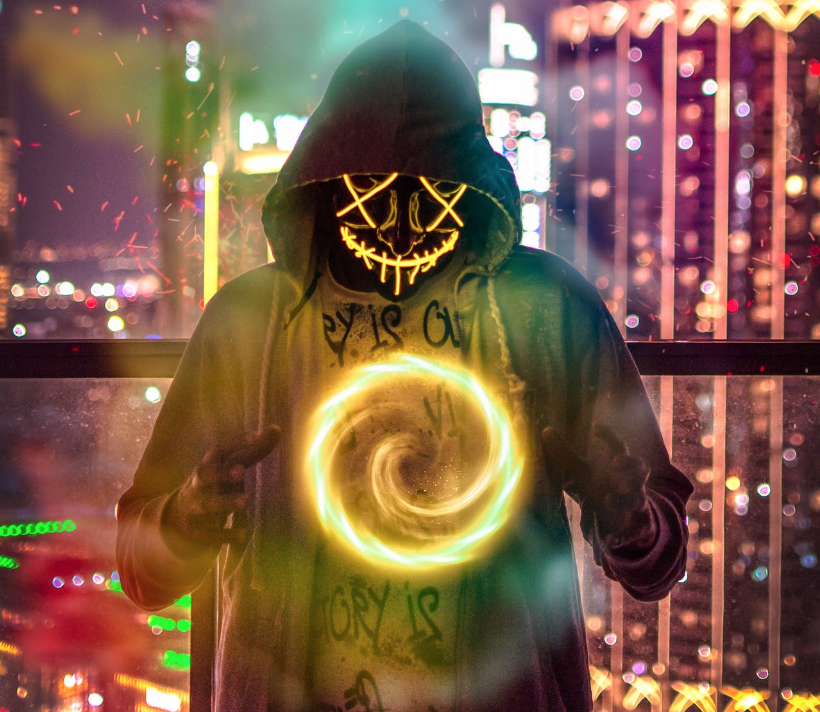
I know there are all sorts of stories out there for all types of readers. This is why there are many kinds of writers. My dear friend Sharon Hughson LOVES sweet romance and Hallmark movies.
I tell her the body count isn’t high enough for me…then she *metaphorically* throws things at me.
Alas, even in sweet books and cozies, there will still be opposition though it won’t be the sort of opposition we’re going to talk about today. These stories have their place—TRUST ME (we’ll get there in a bit).
But evil, REAL evil is not a pet. It is nothing to toy with, though time and again humans do.
It’s in our nature.
Myth, Man & Evil
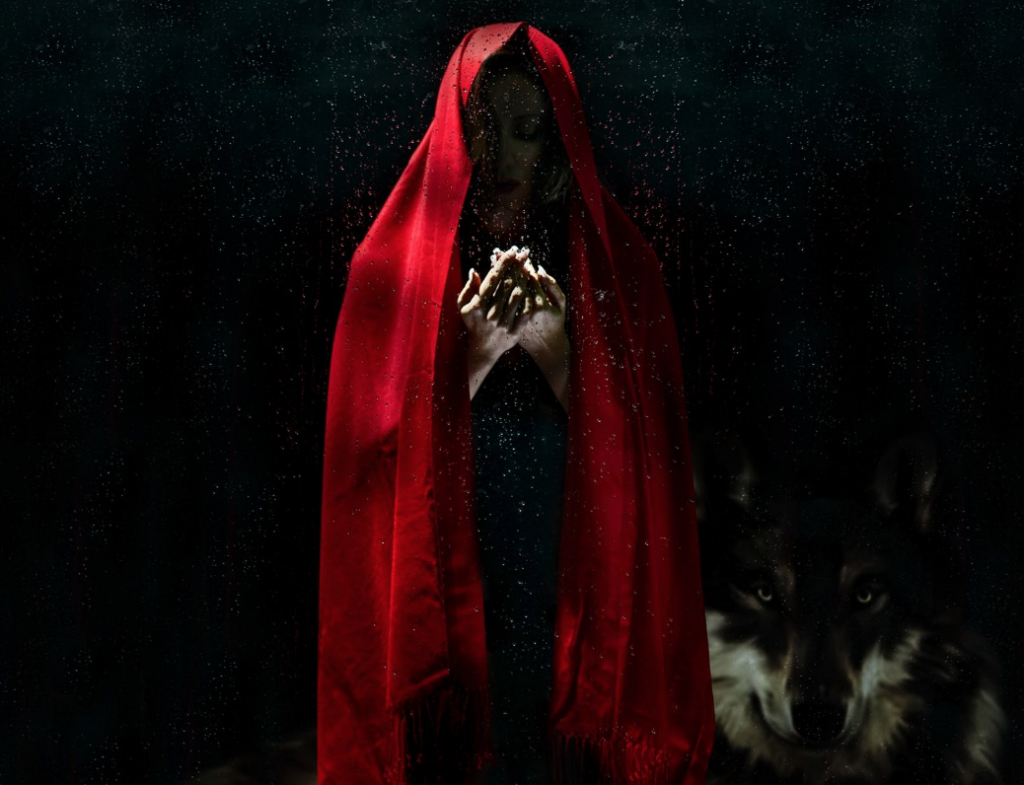
Evil has fascinated us from the dawn of time, a topic that’s said a lot more about the object than the agent. Humans are wired for story. We’ve been telling stories since we created language and communication.
And what makes these stories interesting is some overwhelming force the hero MUST CONQUER or die trying or all is lost. The best stories generally have a villain, and the badder the villain the better the story as we talked about last time.
Humans have always wrestled with the idea of good and evil, right and wrong, the origin of evil, etc. Virtually every faith on the planet explored and explicated good and evil in great detail long before any of us came along to form an opinion.
Myth and story have also added much to the conversation directly or obliquely. Beowulf, Chaucer, Shakespeare, etc.
Wanna talk about good and evil? Read Greek mythology O_O.
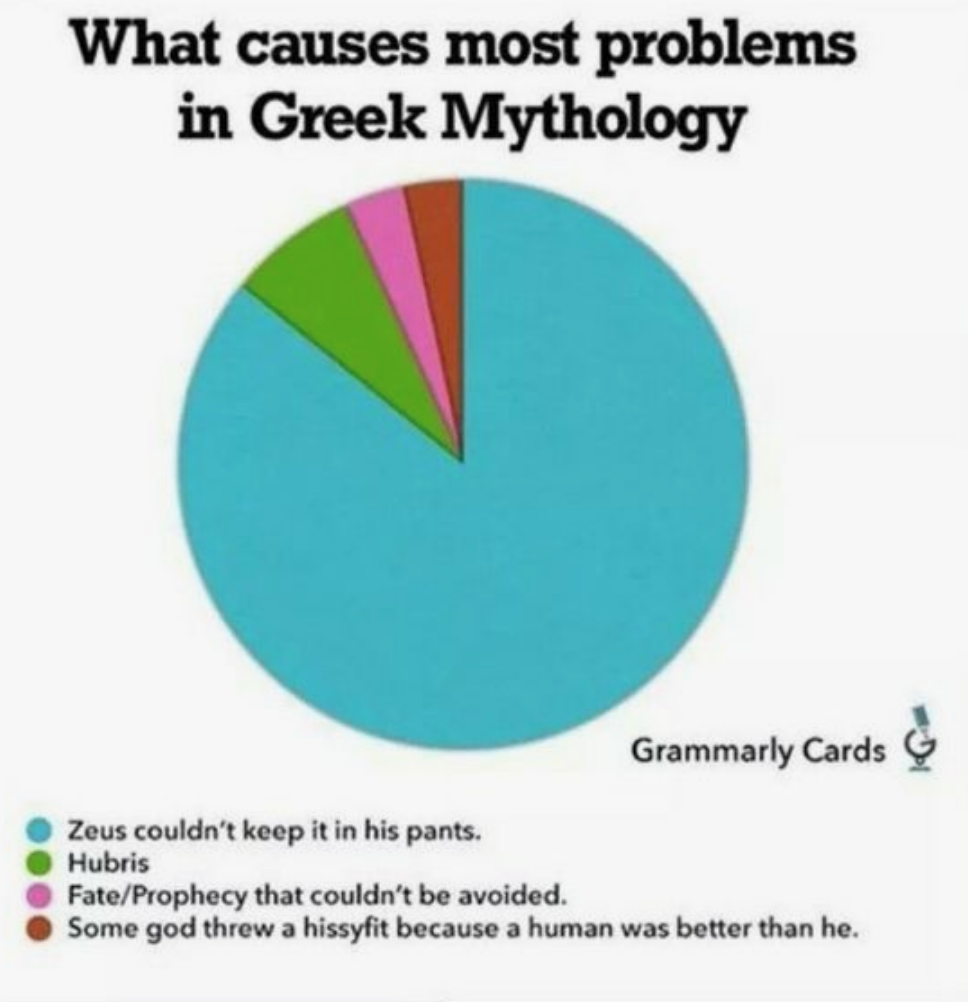
From Dante’s Inferno to Milton’s Paradise Lost to Goethe’s Faust, the audience is privy to glean all varieties of grim and gory images of hell and all its endless torments. What would happen to those evil-doers who failed to follow a certain moral standard.
Oddly, much of this inflammatory literature—*bada bump snare*— has done more to inform people what ‘hell’ would be like than was ever mentioned in the Bible.
Hell was big business in the Middle Ages, mostly because horror movies hadn’t yet been invented.
Evil & The Age of Reason
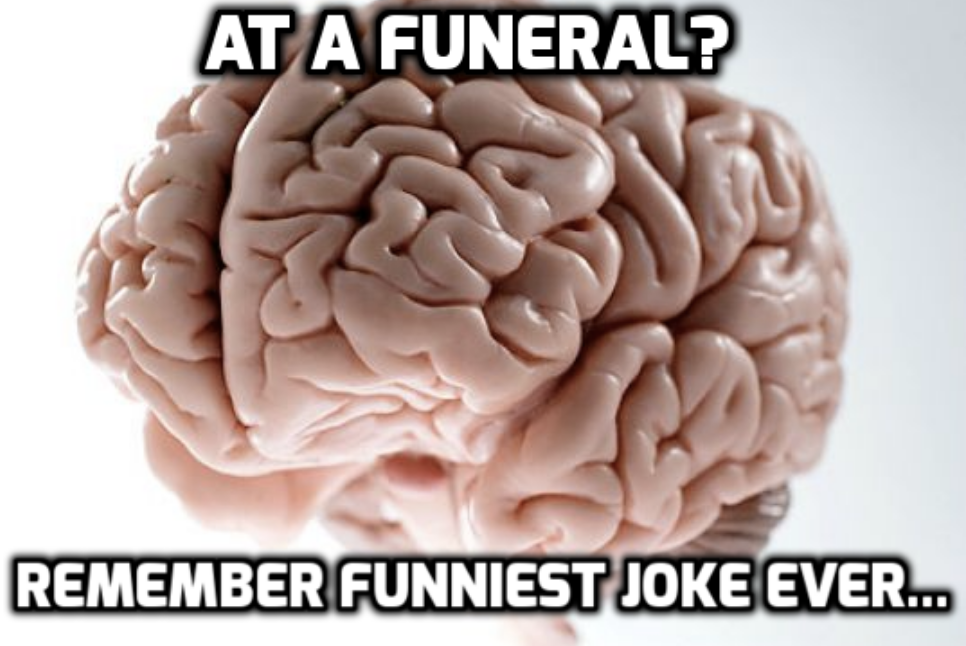
By the middle of the 19th century, science was getting a toehold and taking over areas previously dominated by religion.
Yet, once we careered into the 20th century, psychiatry was blazing untouched paths with new technology, pharmaceuticals, theories, tests, trials, and the chrome-plated word ‘SCIENCE.’
These days (in regards to ‘evil’) neuroscientists are trying to reverse engineer what is going wrong with the brain using fMRI machines. IS there some sort of a mechanical glitch that makes one person choose cruelty over kindness?
Of course, there is one camp that claims that evil people are ‘born that way’ and cite images of some brain doo-hickey not lining up with a cerebral thingamabob. See, they can’t help it! We need a factory recall on these broken evil brains.
Ah, but then they’re countered with the opposition who cite the wonderful marvelous plasticity of the human brain. That we can’t simply look at one shot in time and make any judgement because brains are very malleable, etc. etc.
SEE how fascinating evil is and we aren’t even in a STORY?
This is why friggin’ thousands of years later, we humans have a HADRON COLLIDER that could possibly create a miniature BLACK HOLE.
MEANWHILE, we probably also have some @$$hat who’s fantasizing about tossing kittens into that black hole and ZERO answers as to WHY he’d DO THAT.
Sigh. We deserve the meteor strike.
Evil: Fun & Games Aside
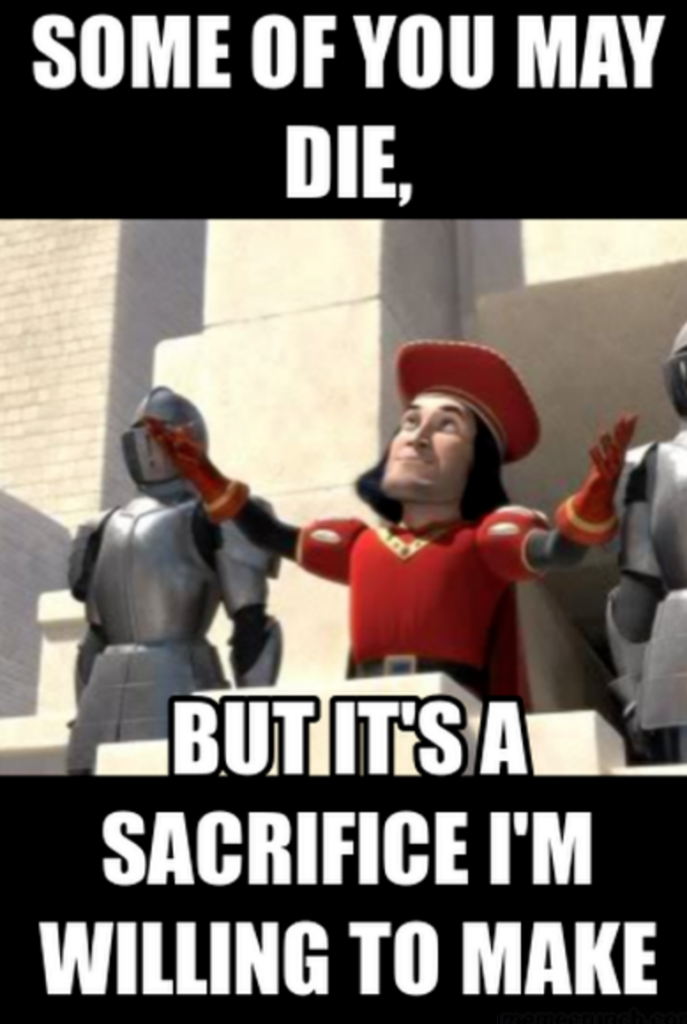
Evil is always an interesting topic because there are never clean and tidy answers. I believe this is what makes for the best stories and the best villains.
I’ve been really sick lately. REALLY sick. I’ve had to postpone my Villains class twice because of bronchitis, but I think it worked out for the best because I’ve revamped the entire thing after reading Ken Follet’s Pillars of the Earth.
***It’s gonna be EPIC, or so the cold medicine voices tell me. Sign up here for Dark Arts: Building Your Villain, and use New20 for $20 off.
Anyway…
Part of me wanted to write Follet hate mail. I hated the book as much as I loved it…for the first sixteen or so hours. Then the ratios shifted more to the loving it side.
Alas, loaded to the gills with medicine, I’m sure my nerves were already shot, but I kept having to stop the recording.
***I listen to mostly audio books, so throwing books across the room means a cracked phone.
There were a number of times I almost quit. My nerves were shredded. I was a wreck. The villains? I didn’t dislike them. Didn’t hate them. I loathed them. Defeat wasn’t good enough, and I strongly doubted ruination was good enough either. Nothing would make me feel better.
N-O-T-H-I-N-G.
There was literally NOTHING that could be done to these characters that would have satisfied my bloodlust.
And, when I calmed down, I thought, ‘What a strange reaction.’ I honestly cannot remember a book that distressed me that much other than maybe Stephen King’s ‘It‘ (the people of Derry, Maine, NOT the clown).
Then, I did what I always do and I pulled the story apart. Reverse engineered the experience and saw the error of my ways.
Now, in fairness, I teach a lot on antagonists and what I call the BBT (Big Boss Troublemaker)—the person/entity responsible for the core story problem.
One of the reasons I read so prolifically is I am always wanting to learn, to uncover any blindspots…and Pillars of the Earth sucker punched me.
It Isn’t for Everyone
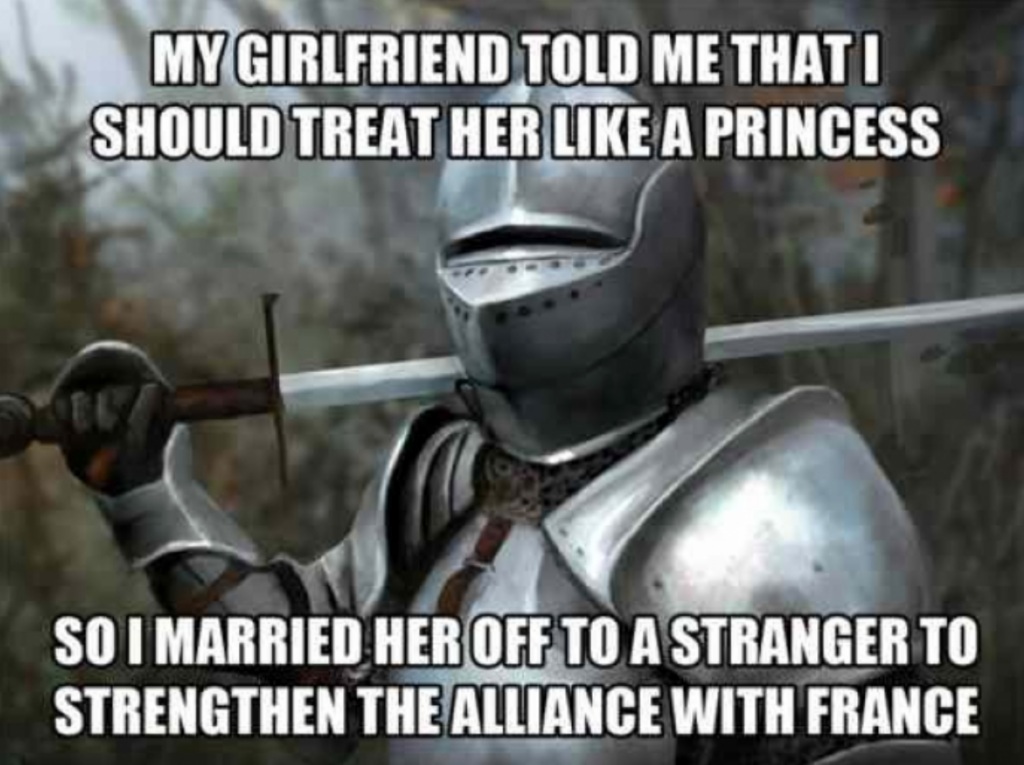
Like any book, Pillars of the Earth isn’t for everyone. It nearly wasn’t for me. Every time I considered turning it in, I kept going until I couldn’t stop because I HAD to know if there was any kind of justice in this mad, mad world.
And there you have it.
We are ALL wired with a sense of right and wrong. Even a sociopath has a sense of justice.
Read Martha Stout’s The Sociopath Next Door. A sociopath might not lose any sleep emptying your bank account, but would be horrified if you did the same to him.
Follet masterfully wove situations where I was rendered utterly and hopelessly powerless.
What is the epitome of being a victim? ZERO POWER. When evil strikes, what does it do to a person?
It strips away their power.
From money crimes to sex crimes, to hate crimes to murder it’s the same. Arson, abduction, terrorism, shootings, burglaries, large-scale vandalism, gossip, slander, lies, it hits us all in the same place.
It makes us afraid and vulnerable and impotent.
What makes it worse? When we KNOW who’s done this, but this is a person no one can touch.
This was what made me practically foam at the mouth reading Pillars of the Earth. Because the story is (loosely) based on actual history. In the Middle Ages, nobility and high-ranking clergy got away with a LOT of really, really bad things.
Talk about powerlessness to the power of a thousand.
*Kristen punching things* *grabbing for inhaler* *ponders subscribing to Hallmark channel*
Yet, it kept me listening (turning pages) because I could not rest until the world was set right and justice was served. I wasn’t even sure it would be or could be. And if it was, HOW?
THAT, my friends, is some fine storytelling (so I am extremely glad I didn’t return the book).
Evil & The Lenses of Power
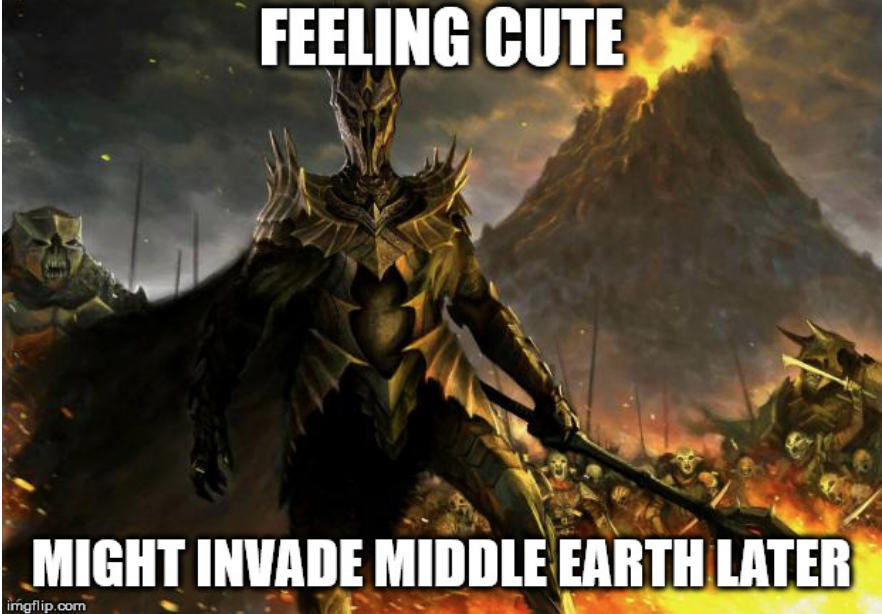
After finishing Pillars of the Earth I thought about other iconic villains. Last time, I mentioned how often villains are the hero of their own story, that we can (Hint: we CAN, but don’t HAVE to) give them an empathetic POV.
This said, Sauron has NOTHING empathetic about him. He craves power for the sake of power no matter the cost or the casualties.
Considering Tolkien drew off his experiences from WWI (not WWII), it’s reasonable to deduce that Sauron is a proxy for the Central Powers. A force rising and gathering strength, bent on destroying all that resists for one goal—complete domination.
Voldemort was another villain who made the heroes shine brighter because he was darker than dark. Maybe he had some motivation somewhere, but the more he destroyed, the more we grieved.
The more he killed, the more people we mourned and the stronger our thirst for vengeance justice.
There was a toxic imbalance in the universe that HAD to be set RIGHT.
Much of what goes into forming villains that gets underneath the audience’s skin is to understand—really understand our story—make sure it is strong enough and then search out those pain points that will likely exist in our readers.
The pain points won’t be the same for all stories.
Evil & To the Pain
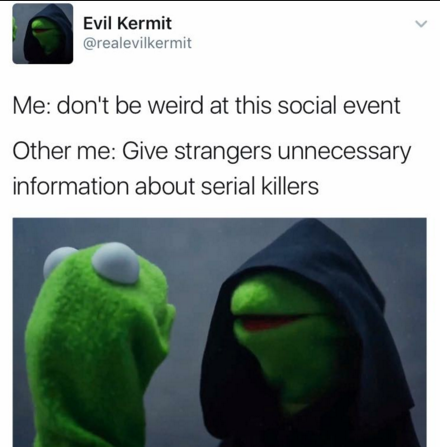
For instance, Follet, used history and the rules of the church and the laws and customs of the time to vex the ever loving bejeezus out of me *great gnashing of teeth.*
One of the reasons I got so ridiculously upset was because I’m a history buff, and knew what these folks could get away with. I also knew they were exploiting the chaos of the civil war to break laws that, in a time of peace, would have had them hanged.
This said, understanding these realities from an academic point of view is one thing. Watching these horrors play out in story, through the eyes of characters is vastly different.
Especially when in the heads of the villains.
*washes brain with bleach*
To use a very different example, but one that had a similar effect.
How many of you read or saw the movie ‘The Help‘? When Hilly Holbrook built the bathroom specifically for ‘the help,’ I saw red.
But when Hilly fired Minny for refusing to go outside to use ‘the help’s’ bathroom during a dangerous storm and for using the guest bathroom instead?
Then she unnecessarily slandered Minny’s name insinuating she was a thief, thus making Minny essentially unemployable?
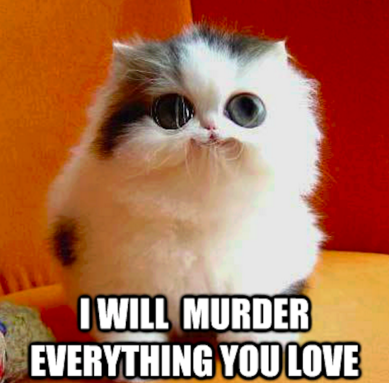
What made this whole tableau so infuriating was technically Hilly (villain) hadn’t done anything wrong. In fact she had plenty of high society ladies there by her side telling she was the victim, poor dear.
*growls*
Of course the wrong Minny suffers is only one of many, inflicted by a toxic, deluded, and diseased culture. We hate it and every time the women we’ve grown to love suffer, we suffer.
And then—FINALLY—there is victory. We can celebrate!
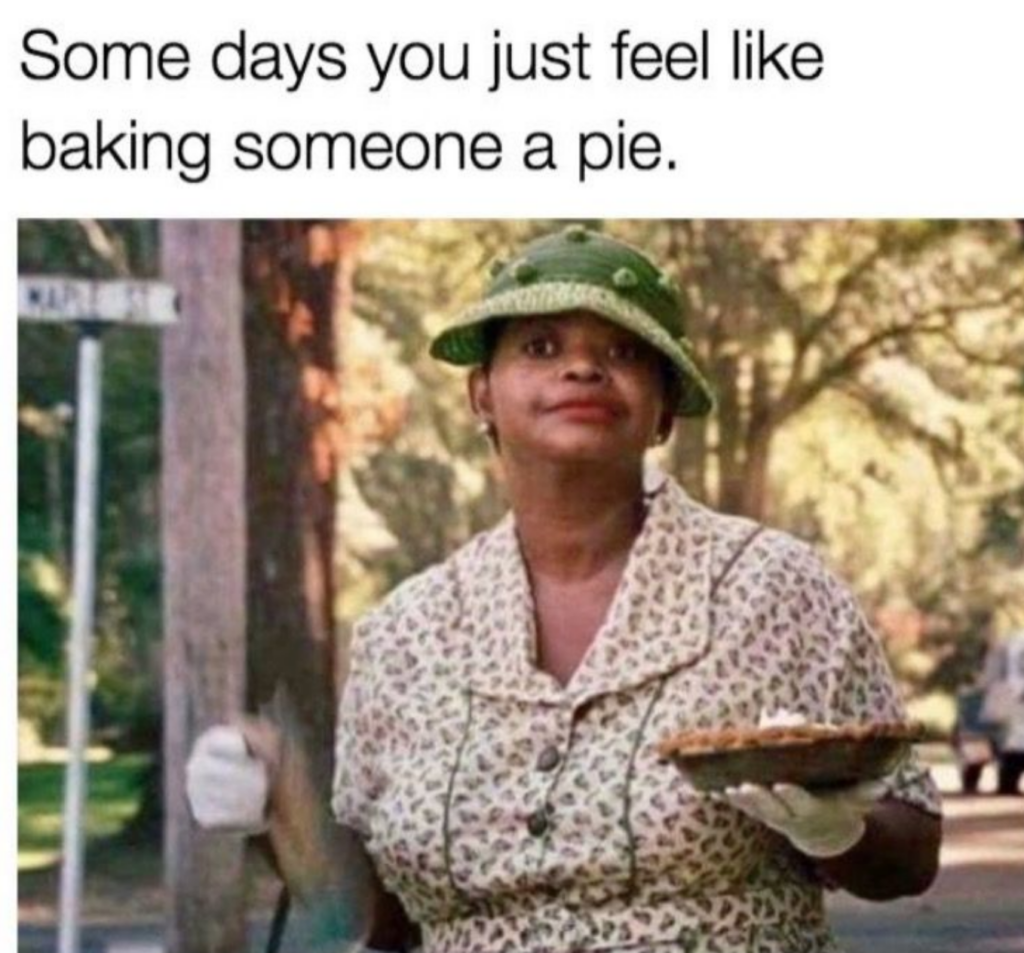
Depending on genre will depend on what pain point you’ll want to exploit, how hard you’ll want to push, and how to reasonably give your reader the satisfying ending they crave (that doesn’t feel too cookie-cutter).
How can we make our reader feel helpless? What ways can our villain strip away their sense of power? Can we make it seem our ‘good guys’ will never get their power back? Is there a way our villain can hide behind the authorities?
There are a lot of ways we can upset the main character’s world, but largely it is going to be with yanking the rug from under his/her feet.
If we can get a resounding cry of, ‘That isn’t FAIR!’ from our readers?
All the better.
Fiction & the Fight Against Evil
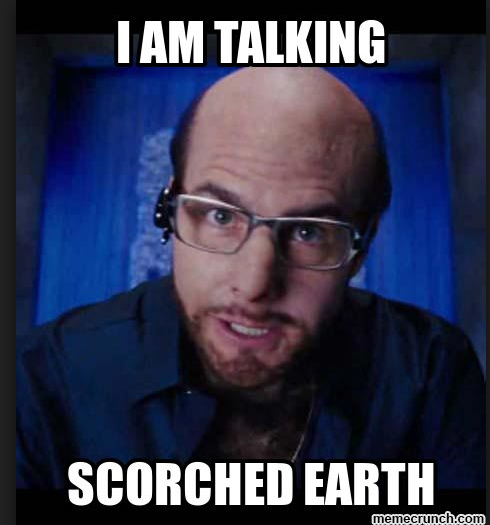
All too often, fiction gets dismissed as foolishness. Fantasy. It’s a waste of time. Is it? Or do stories serve as humanity’s conscience? They have for more than several thousand years. Don’t see why that would suddenly change.
Samsung just released a giant flatscreen television they’re literally calling The Wall. I’m guessing no one in marketing has read Fahrenheit 451.
***Unless the marketing staff are mostly Gen Xers, then they’re probably being smart@$$es.
Bladerunner, Do Androids Dream of Electric Sheep, 1984, Brave New World, Animal Farm, the list goes on. Frivolous brain candy or cautionary tales?
I believe fiction is the safe place, the mental holodeck where we can experience catharsis. Fiction allows us to explore a whole pallet of human emotions, some of them nice like love, comfort and nostalgia. Perhaps a story of simpler times and family *nods to Sharon*.
Other stories? We get to deal with, explore, understand outrage, anger, grief, injustice, the less ‘socially acceptable’ feelings in our modern world.
Villains allow us to have that face-off with evil and test our mental and psychic mettle. We can at least—in theory—answer the question, ‘What are we made of?’
Because the truth is, we don’t know.
I’m certainly hoping I never know.
All arguments of evil, villains, nature, nurture, and brain glitches aside, we don’t know what any of us are capable of with the right set of circumstances.
And if we’re smart, that should scare us.
In the End
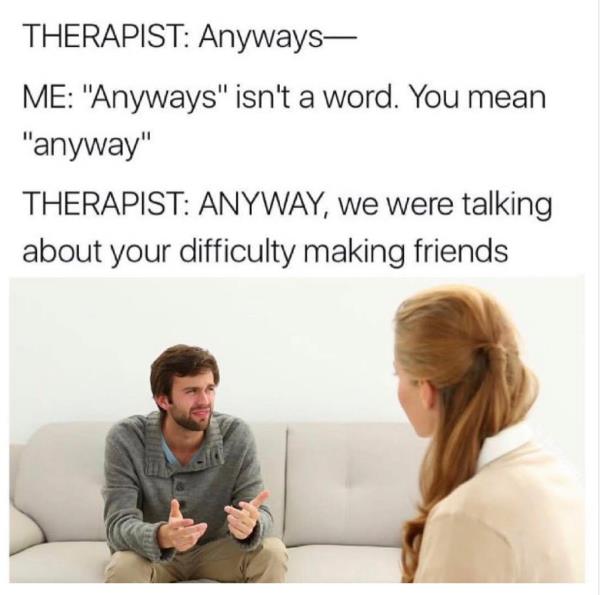
The debate about evil will rage on, but that means people will keep craving new stories. Yes, we humans have our skyscrapers, espresso machines, yoga dress pants and our Hadron Collider.
We might even one day get our tiny black hole. Yet, we still have our psychopath out there with a box of kittens. Evil still exists.
But we’ll get balance.
When our psycho tosses those balls of adorable fluff into that eensy black hole, the joke will be on him. Because if any creature could discover a multiverse it would be a kitten.
They’ll return in force—with an army of sentient socks and Tupperware lids to negotiate peace with Earth.
They’ll leave us unharmed, if we will just let them have all the catnip, tuna, and Dan…wearing a Princess Leia metal bikini with a zap collar.
What are your thoughts?
Can you think of villains from story that had nothing redeemable and the reason you turned pages was to see their demise? Or movies or series? What are some examples you can think of when it comes to stories that undid you and really made you think/made you emotional?
I love hearing from you! And maybe some suggestions for my reading list 😀 .
And to prove it and show my love, for the month of NOVEMBER, everyone who leaves a comment I will put your name in a hat. If you comment and link back to my blog on your blog, you get your name in the hat twice. What do you win? The unvarnished truth from yours truly.
I will pick a winner once a month and it will be a critique of the first 20 pages of your novel, or your query letter, or your synopsis (5 pages or less). Will announce October’s soon. Finally back to feeling ‘normal-ish.’
In the meantime, PLEASE treat yourself to a class!
***NaNoWriMoSaleOH! Plot Boss: Writing Books Readers Want to Buy ON DEMAND ONLY $25 ONLY UNTIL 11/22
Upcoming LIVE CLASSES Through November
Yes, I know most of us will be doing NaNoWriMo, which is why a FREE recording is included with your purchase.
Dark Arts: Building Your Villain
November 19th, 2019 7:00 P.M. tp 9:00 P.M. EST (NYC TIME). Use New20 for $20 off.
These are all new classes this week so we are giving deep discounts for being there to help us explore all this uncharted uncharted territory!
Why Are We HERE? Scenes that HOOK
FRIDAY, NOVEMBER 22nd, 2019. Use New20 for $20 off.
Tick Tock: How to Plot Mystery Suspense
THURSDAY, November 26th 7:00-9:00 p.m. EST (NYC TIME). Use New20 for $20 off.
ON DEMAND CLASSES
The Art of Character: Writing Characters for a SERIES ON DEMAND
Use Binge10 for $10 off.
How do we create characters that readers will fall in love with, characters strong enough to go the distance? Find out in this THREE-HOUR class that also comes with detailed notes and a character-building template.
This class dovetails with my previous class:








19 comments
1 ping
Skip to comment form
I stuck with the movie “There Will be Blood” in hopes the Daniel Day-Lewis character, Daniel Plainview, would show even the tiniest hint of having a decent cell in his body. Nope. Nada. Zilch. I absolutely hated this story. He was unredeemable, and the ending didn’t satisfy me that he would get what was coming to him. I’m a person who needs to feel that justice (well, my idea of justice) has been served to the villains in books and movies.
Thanks for painting me as someone who despises a body count in the books I read and write 😉 I hope you’re feeling better. I love your posts because you always make me laugh…and teach me something.
As for Hallmark movies…there may be a blog post coming from ME that talks about how they are getting too predictable and (are many times) leaving out believable character arcs and good resolutions.
Lawd hep us, Samsung’s Wall. Definitely Fahrenheit 451-like. And didn’t Bradbury also write something about a children’s playroom which was really the Serengeti and wound up essentially eating the parents? (I love him.)
Understanding Evil should probably go back to the reason humans discovered spirituality in the first place. Shortly after we discovered selfishness, we had to find a way to combat it. Every evil thing which occurs in this world has its root in selfishness. Here’s the definition, in case anyone has forgotten what it is. (of a person, action, or motive) lacking consideration for others; concerned chiefly with one’s own personal profit or pleasure. How else did we end up with civilizations and the various forms of government, where a few people get to sit at the “top” and tell the rest of us what to do? Perry was probably doing more than torturing small children and animals. No doubt, he, with Yell as his enforcer, told the rest of the tribe, “You are all too stupid to fend for yourselves. I tell you what, make me chief and I promise you will never go hungry or ever want for anything.” Then he “led” them on a mammoth hunt, stayed out of harm’s way to “supervise”, sat on top of the kill, and kept the best cuts for himself and Yell. If you really need an example of how insidious evil really is, all any of us have to do is think back our own day and ask ourselves, “How many decisions did I make today, based on the definition of selfishness?” One with which “first world” societies may have become just a bit to comfortable? Being distracted behind the wheel of a vehicle, which is already a multi-tasker. Every time we’re on the road with our phone in our hands, we’re telling others who are sharing the same road, “My text messages or entertainment matter more than your safety.” How many of us are actually thinking that, while our phones are in our hands? Or while we’re doing anything else which ultimately harms others? The narcissists and psychopaths, on the other hand, know they’re doing it and derive pleasure from it. Because in his/her world, they are the only one which matters.
Author
Martha Stout’s book ‘The Sociopath Next Door’ is fascinating and terrifying at the same time. Like you mentioned using my silly story, sociopaths are very useful. For instance, we wouldn’t want a super empathetic person sawing into our head looking for a tumor.
We would (should) want someone who can compartmentalize emotions. One of the reasons we see high percentages of sociopaths in medicine, law, military, law enforcement, as CEOs, etc. is they have to be able to make decisions that would emotionally destroy most regular people (that often DO destroy regular people).
As Stout points out, a large number of sociopaths actually never become criminals. There is an advantage to being a sociopath. But when they go bad? Katy bar the door.
We are also seeing stark rise in sociopathy in modern society (perhaps a post for another blog) and I think it has to do with a lack of socialization, AUTHENTIC socialization.
Too many children and adults have superficial relationships. No skin in the game. We are losing our ability to connect and that should scare us. And yes. Every time I see that person doing 70 on the highway scrolling Instagram, I think about how selfish that is. How many people could die over something so utterly…meaningless.
Problem is I DON’T believe they ARE thinking. I believe too many of us are on autopilot. We’re too wired to reach for the phone without THINKING fo consequences. And that is also very frightening.
Like I said…interesting topic 😉 .
Sorry. The reply button doesn’t seem to be working at the moment. I probably am the sociopath next door, otherwise I have no idea how I could come up with the “history lesson” of Perry and Yell building a civilization. I actually did work in health care for nearly ten years, though I didn’t think I was suited to it. I have a friend in Michigan who has expressed surprise I haven’t attempted taking over the world yet. I like to think its because I’m a properly socialized person, though in reality the failure is most likely due to laziness. On the other hand, the world likes to call middle-age being young. Perhaps its not too late to consider a new career path.
Author
No, the reply button works. Just this new version makes me have to approve you. Sigh. I know I have somewhat sociopathic tendencies. I come from a VERY Scandinavian family. We are mostly farmers, military, law enforcement, and medical people. Very practical and not terribly emotional and very good at compartmentalization which can be good at times and bad at others.
I am great for a crisis, am great at making the tough choices but suck at being softer, gentler. Working on it. Have to remember to slow down, think from the other person’s POV, EMPATHIZE. I don’t think I would be a good villain as I am. I have too much of an overactive conscience. But GOD HELP anyone who hurt someone I cared about. That’s why I said I hoped I would never be tested. I am very afraid of what I might be made of. I hope to never actually know.
I’m a little bit Scandanavian too. Norwegian on my mom’s side. Supposedly, my great-great grandmother was a descendent of the first king, Harold Fair Hair. Perhaps it gives me delusions of granduer? My husband complains I’m not sentimental enough for a woman. Comes in handy in an emergency though. I unintentionally “caused a little accident” this past Sunday. Very exciting! Took care of it mostly by myself because I had no choice. Decided to turn it into a blog post which is on the schedule for next weekend.
One trend I have noticed in recent fiction, especially movies, is giving villains a backstory that says, “It is someone else’s fault that this villain is this way.” This bothers me. It feels like I can’t have that sense of justice at the end of the story, I am only to feel sorry for them because they had to endure a comment or bad upbringing or something, and in return, the villain turned bad. It doesn’t acknowledge the ability of the individual to choose good over evil.
I read a lot of Golden Era mysteries, and it’s interesting how often the idea comes up that evil is somehow an imbalance of the glands, something that could be fixed with an injection if we only knew what to inject. But over time the glandular Theory of All Things lost credence, and it was on to the next fad.
It seems like every new scientific discovery (electricity! x-rays! nuclear fission!) is greeted with adulation in the belief that it is somehow the panacea humanity has always needed… until we find it isn’t.
Great things to be thinking about here, as always. Something I’ve noticed recently related to the villain being the hero of their own story is that sometimes the villain gets a bad rap for being opposed to the protagonist- even if the villain’s actions aren’t even wrong or bad. Granted I’ve mostly seen this in children’s lit and movies lately where stories may be a bit more simplistic but it got me thinking anyways about what makes someone a villain and what makes someone the protag. Lots of room for gray…
Author
Antagonists and villains aren’t the same thing. Look up my posts on the Big Boss Troublemakers. Villains are only one flavor of villain. Sort of like Rocky Road is ice cream but not all Rocky Road is ice cream.
I loathe the current villain in “Fear the Walking Dead,” Ginny. She exudes southern charm and politeness, but we all know that her heart is stone dipped in liquid nitrogen. She chaps my hide more than any of the Walking Dead villains yet, including Negan. Part of me wonders why she bugs me so much. It’s an emotional reaction that can’t be explained rationally, and the writers of TWD are to be commended for pushing my buttons so effectively.
You spoke of cautionary tales. One such story is “The Ballad of Lost C’Mell” by Cordwainer Smith, which explains about a society that mixed human and animal genes to create slaves and how well that’s working out. As in ‘not’. It is lyrically written, I might add (the author’s day jobs were espionage and translating Chinese poetry). Related stories for that same society are “Alpha Ralpha Boulevard” and “The Dead Lady of Clown Town”. They’re good.
“They’ll return in force—with an army of sentient socks and Tupperware lids to negotiate peace with Earth.” Love it! 😀
Blimey – this is a marathon (or should that be mammoth) article. I’m afraid hunger pangs struck half way through and I had to break off to seek sustenance. Now I’ve read it all (brilliant) I need to go away and think about it – this is not something you can throw a quick quip at.
Good people are capable of being bad, not necessarily deliberately, simply through inaction. Evil people people are capable of doing good, though it tends to be because they can gain from it rather than a sudden surfacing of benevolence.
Someone up thread said evil is rooted in selfishness and while this is true it only applies if there is personal gratification. There is also the evil of indifference – where meeting out pain or disaster gives no reward but they it anyway because they can. And are they any better or worse than the person who presents a public air of a do-gooder that has the masses believing they are are wonderful while hiding a private catalogue of evil deeds – sometimes fact can be more extreme than fiction – https://www.theoldie.co.uk/article/the-oldie-scoop-that-exposed-jimmy-savile
Human nature can’t be compartmentalized with no overlaps. Who can say what a good or bad person would do in extremis?
And this is what we have to reflect in fiction. The ‘flawed’ hero is becoming something of a trite phrase and it strikes me that in recent years this has sometimes been taken too far. One example that comes to mind was a book I read recently where a police detective sneaks off for an S&M bondage flogging as punishment for failing to nail the bad guy. Far from making this character more real it made them ridiculous in my mind – no police officer wishing to keep their job would put themselves in this position no matter how guilty they felt.
We need to strike a balance and perhaps that is not found in dumping doses of good and evil (no matter which way they are weighted) in our stories but in making plausibility of their presence the favourite to win over our readers.
I think this discussion can go even deeper when you toss in the concept of pride into the mix.
When you think of villains and the rise of evil, I agree that selfishness is a major contributor, but I wonder if selfishness is more a symptom of evil than it is a source of evil. If you look at original evil, you’ll find that the devil became the devil only after he believed he was as great as God (Isaiah 14). Why would he think he’s as great as God? Pride. When you look at original sin, you’ll find that the devil convinces Eve that God is holding back on her and Adam. God tells Adam and Eve that they can eat from any tree but from the Tree of the Knowledge of Good and Evil. When the devil asks Eve if God really said that they can’t eat from *any* tree, and she begins to doubt God’s words (and improvise her justification with words that God didn’t say by adding to what He did say), and Adam says nothing to correct the situation, they finally decide to eat the forbidden fruit because the fruit is good for eating, and it would allow them to know good and evil *just like God*, and God surely must be holding back on them by forbidding it. Why would they think God is holding back on them? Pride. For some reason they believe they deserve to know what God knows. We still do.
It seems that a real villain will make his decisions based on pride (“I deserve this thing I want, and I will have it however I can get it!”) and will make whatever choices, sane or insane, that are necessary to keep his pride (and get his MacGuffin), even when the entire world or his own life falls apart by his actions. If you analyze every great villain, I imagine you’ll find that pride lurks in his or her heart, whether that pride is in himself, in a faulty system or practice he believes in, or in something otherwise irrational. If the villain isn’t proud, is he really a villain?
Obviously, this would apply to scheming or thinking villains. I don’t think monsters would fit this paradigm. For example, I don’t think Jaws has any pride. I think he’s just hungry and has a weird taste for human flesh. I’m also trying to figure out Heath Ledger’s Joker. In the movie, he’s regarded as a source of chaos, but then again, his undoing comes when he believes that New Yorkers would sacrifice their neighbors to save themselves. Pride in a faulty belief.
The rabbit hole is deep here, certainly, but I think we could clearly define our villains by their inability to humble themselves and defer their thoughts and actions to doing or thinking what’s right (or sane). I think even our antiheroes and morally gray heroes can fit into this category up until the point of change, making for some interesting conflicts, internal and external.
Author
Oh I agree. If one looks to the ‘Seven Deadly Sins’ I believe the root of all really is pride. As to monsters, I defer to Dungeons and Dragons. Animals are completely neutral. They are not ‘moral’ creatures and rather driven by instinct so can’t be good or evil. A shark is gonna shark.
[…] a Han Solo Hero in Six Easy Steps. Kristen Lamb goes in the other direction and reminds us that the villain can be much like you—or her. Stavros Halvatzis discusses character flaw in stories, Janice Hardy looks at how to make an […]